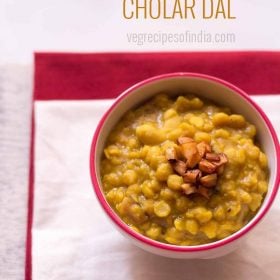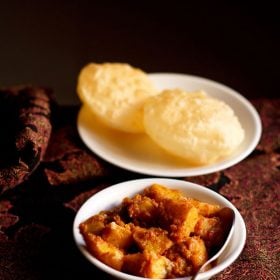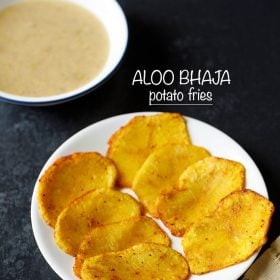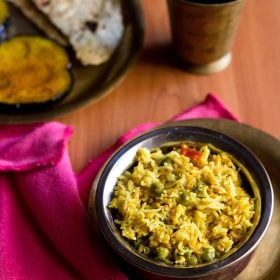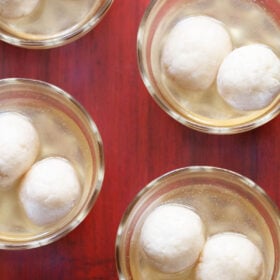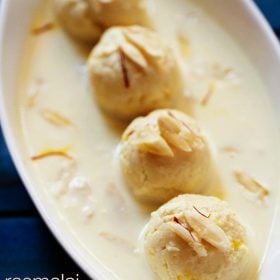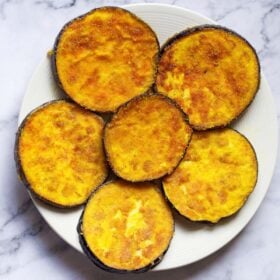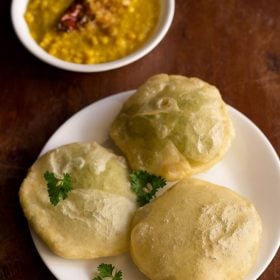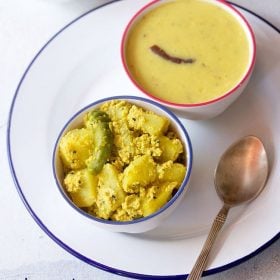Aloo Posto or simply potatoes (aloo) cooked in a lightly spiced poppy seeds (posto) paste is that dish, which almost every Bengali is fond of. There may be some exceptional cases, but those are very few. This Aloo Posto recipe is easy to prepare, flavorful, makes for a great side dish with a dal-bhaat (dal and rice) combination, and is also naturally vegan and gluten free. You should definitely give this classic dish of Bengal a try.
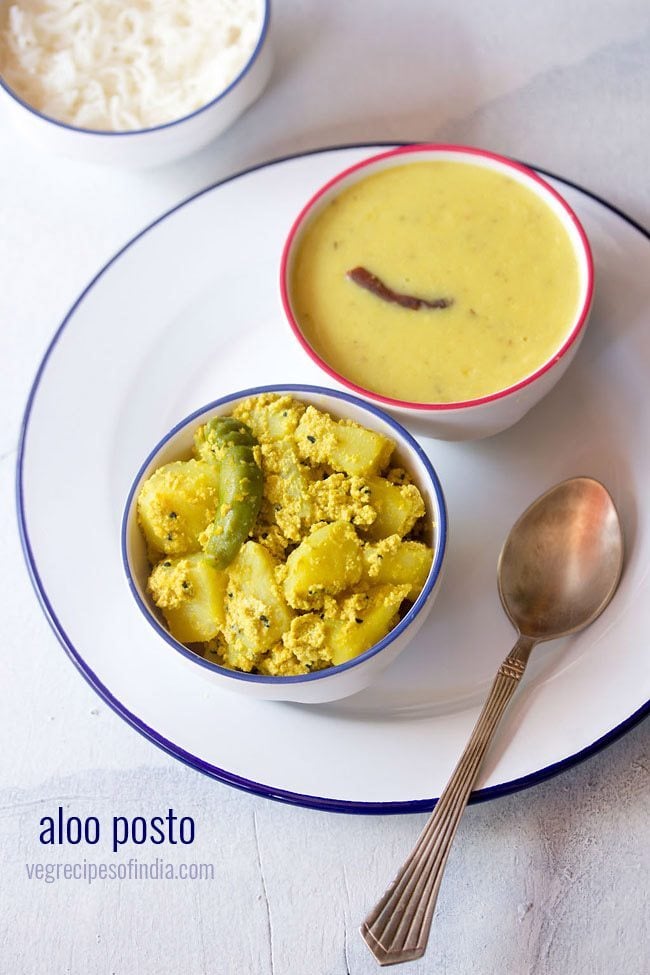
What is Aloo Posto
“Aloo” translates to potatoes, and “posto” refers to poppy seeds in the Bengali language. Therefore, the name of this traditional dish from Bengal. In different parts of India, poppy seeds are known as “khus khus.”
Aloo Posto features potatoes cooked in a delectable paste of spiced poppy seeds. The dish balances the earthy flavors of potatoes with nutty poppy seeds, spicy green chillies, fragrant nigella seeds, a few savory ground spices & seasonings, and the distinct pungent touch of mustard oil.
Table of Contents
Not just for a Bengali, I can easily say that Aloo Posto is one of our comfort foods as well. Having it with steaming hot rice and/or some dal by the side makes for a comforting meal for us. Hence, I make this classic Bengali dish often at home.
The recipe of Alu Posto was shared by our Bengali house help some years back. At that time, I had noted down the ingredients and method, not knowing that it’s soon going to hit a jackpot for our taste buds. Thus, a preferred choice of an aloo-based dish for me and my family.
Primarily, an Aloo Posto recipe is free of onion and garlic. So is my version of the recipe too. However, I do known people who add onions to it, you can do that as well. Since I have always made it without onions, I’m not sure of the taste like that.
I also add some turmeric powder in my Aloo Posto. Although it is optional. There may be some other variations like adding of sugar, dried red chilies or Panch Phoron. But I follow the procedure which was given to me and thankfully with that, it has always been good.
More On The Recipe
Like I have stated above, the other essential ingredients of Aloo Posto recipe other than potatoes and poppy seeds are mustard oil and nigella/onion seeds or kalonji. You really cannot substitute these with any other ingredient. These are also a part of many other traditional Bengali recipes.
Make sure the poppy seeds that you are using are super fresh and in shelf period. If they start turning rancid or are already rancid, discard them immediately. There’s no way you should even think of using it, as it will spoil the entire essence of the dish. It will make the Aloo Posto bitter.
Traditionally, Aloo Posto is accompanied with kalai dal or biuli dal (urad dal) and steamed rice. But you can have it only with the rice too. A more quick or modern way of having it would be to pair it with chapatis or bread. But trust me, Aloo Posto with dal-bhaat is a match made in heaven!
How to make Aloo Posto
Make Poppy Seed Paste
1. Soak 3 tablespoons white poppy seeds in ¼ cup water. I usually soak the poppy seeds overnight, so that the grinding is easier.
Otherwise they may not grind well. If you forget the soaking, then soak at least for a couple of hours in lukewarm water.
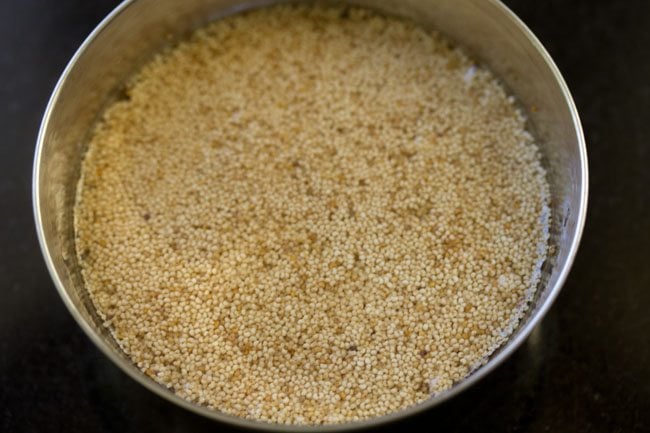
2. After overnight soaking, use a fine mesh strainer and drain all the water. Below picture shows the soaked poppy seeds.
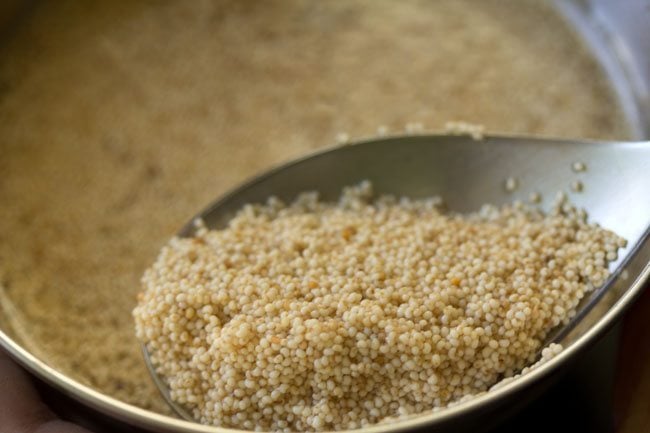
3. Add the poppy seeds in a small chutney grinder.
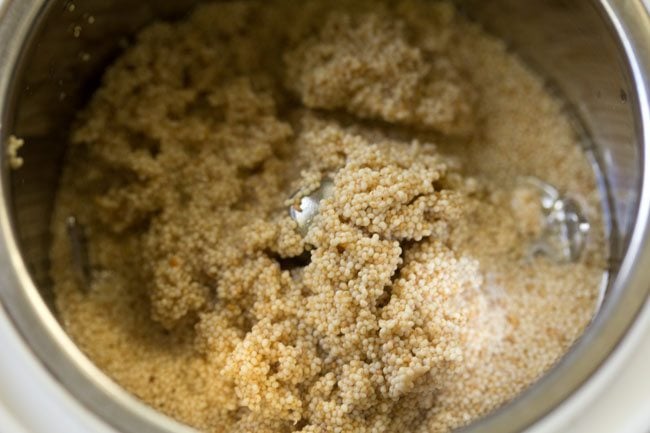
4. Add 1 green chili (about 1 teaspoon chopped) and 1 tablespoon water.
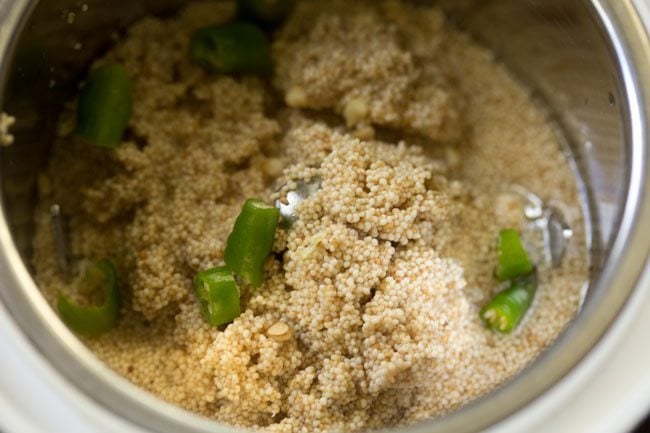
5. Grind to a fine and smooth paste, incorporating more water if necessary during the grinding process.
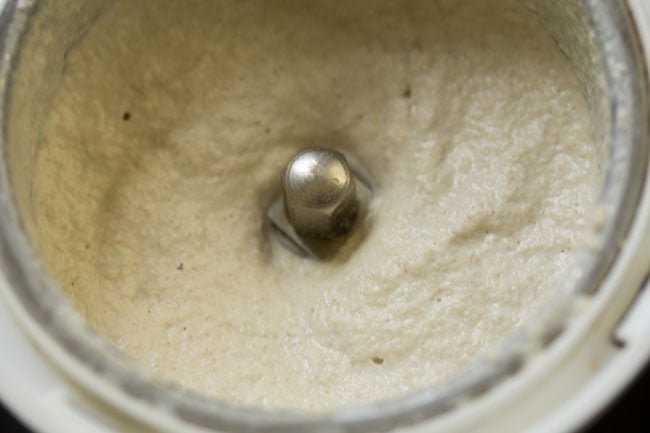
Make Aloo Posto
6. Next, rinse, peel and chop 2 large (300 grams) potatoes into 1 to 1.25 inch pieces.
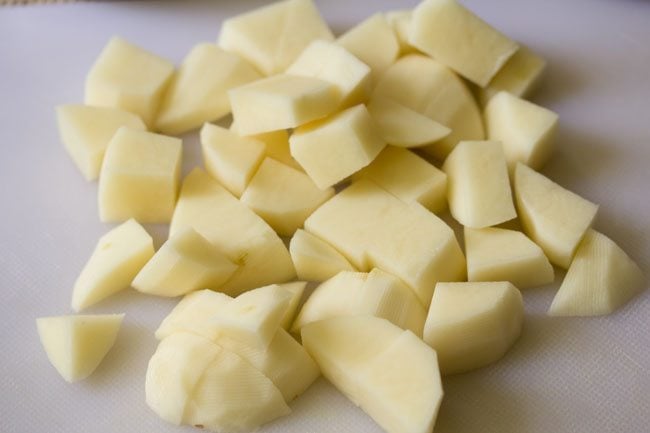
7. Heat 2 tablespoons of mustard oil in a pan or kadai (wok) until it starts to smoke gently on medium heat.
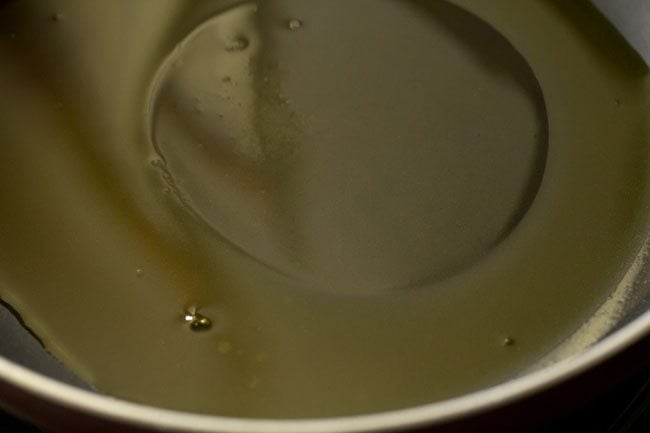
8. Lower the heat and add ½ teaspoon nigella seeds (kalonji).
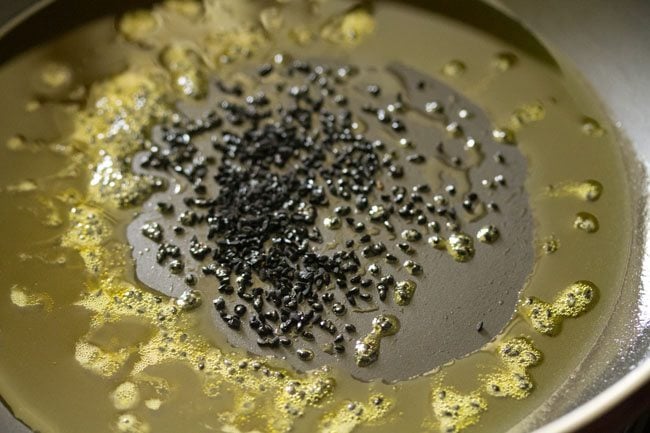
9. Stir and sauté the nigella seeds for a few seconds.
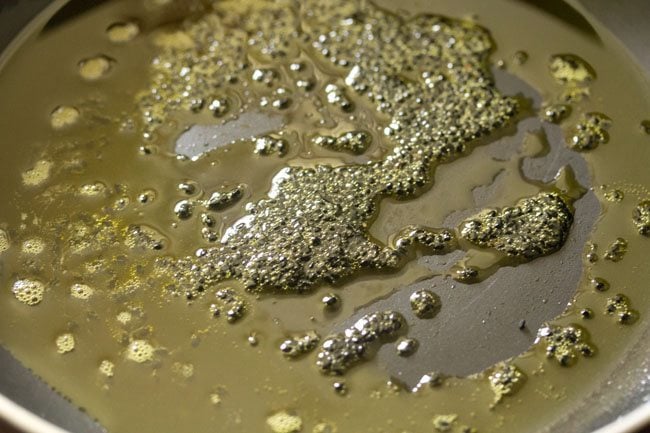
10. Add the chopped potatoes.
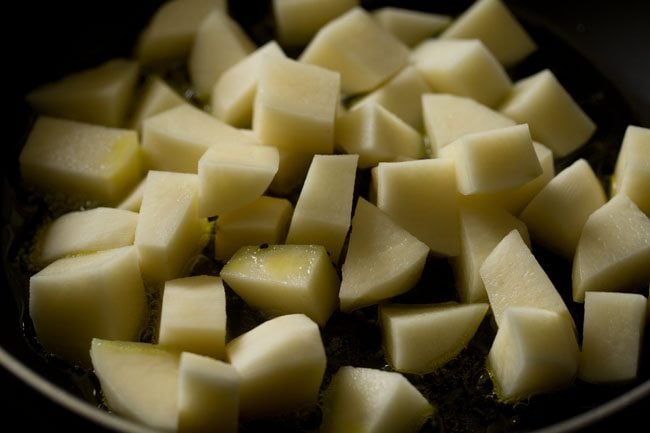
11. Mix very well with oil and nigella seeds.
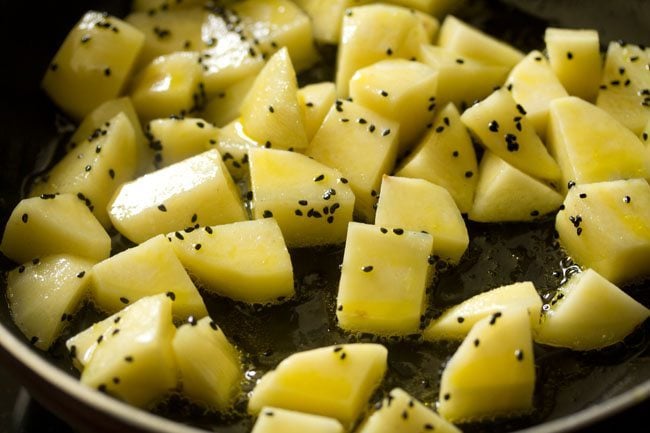
12. Sauté the potatoes on low heat, stirring occasionally, until they are partially cooked and show a faint golden hue at the edges.
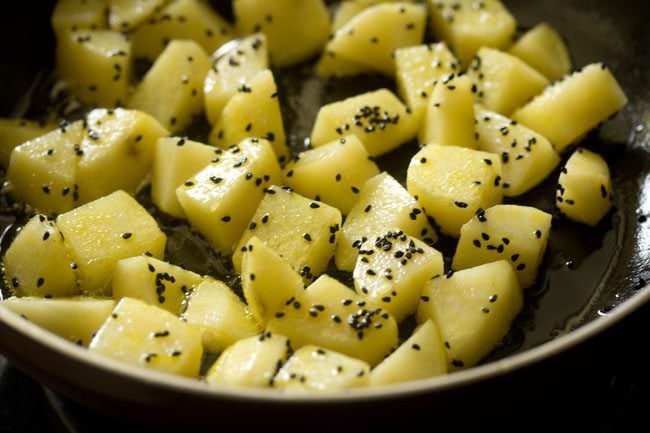
13. Next, evenly sprinkle ¼ teaspoon of turmeric powder over the potatoes. It’s optional, and you have the choice to omit it if desired.
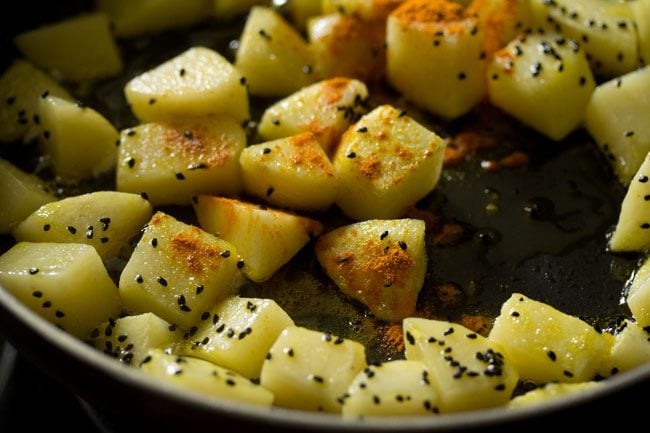
14. Thoroughly combine the ingredients.
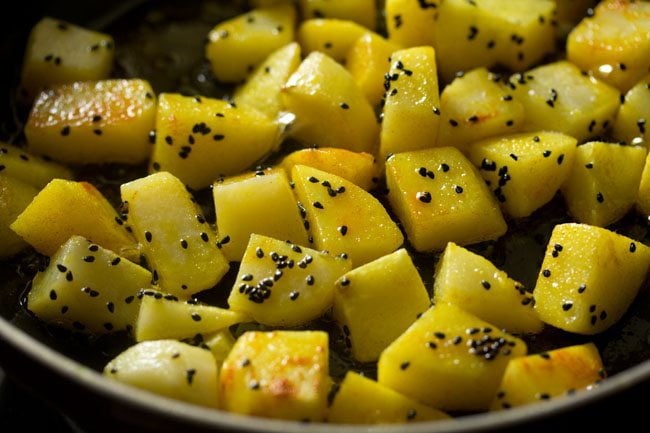
15. Add the prepared poppy seed paste and 2 whole green chilies (not slit).
Scrape off all the poppy seed paste from the grinder jar and add. You can even rinse the jar with some water and add it in the pan.
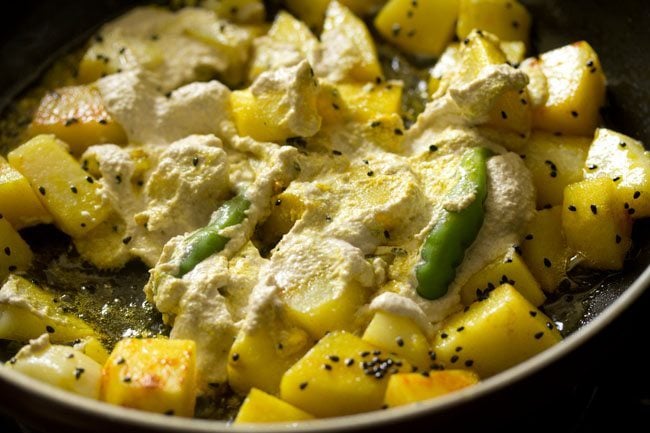
16. Mix again.
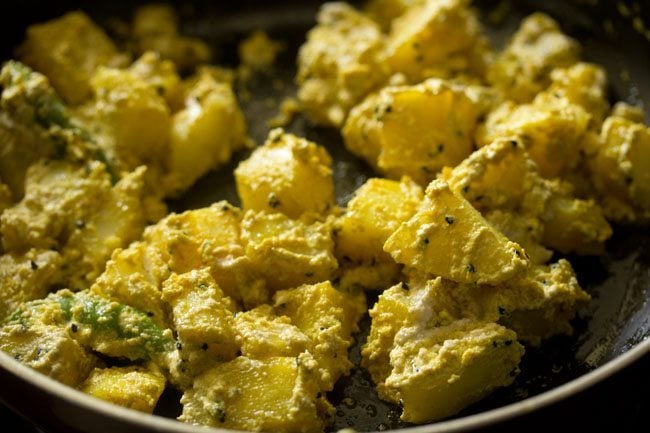
Cook Further
17. Pour in ½ to ⅔ cup of water, adjusting the amount based on your preferred consistency.
Typically, Aloo Posto is dry to semi-dry, but for a more gravy-like consistency, feel free to add additional water.
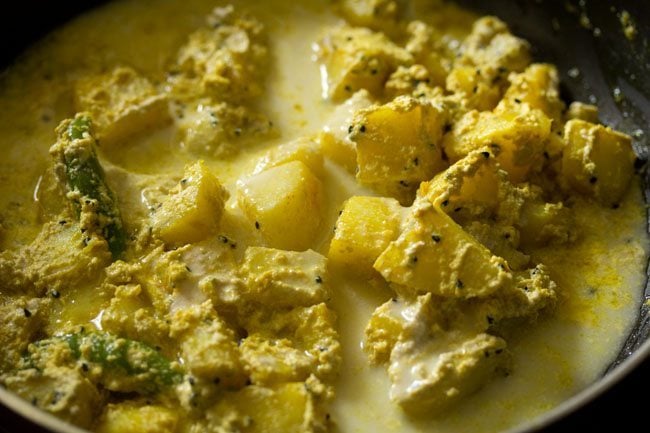
18. Stir and thoroughly mix.
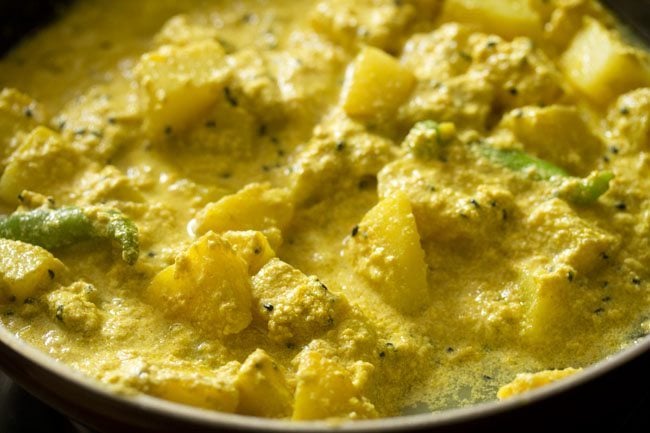
19. Season with salt according to your taste. Optionally, you can add about ¼ teaspoon of sugar, adjusting based on your preference. Personally, I choose not to add sugar.
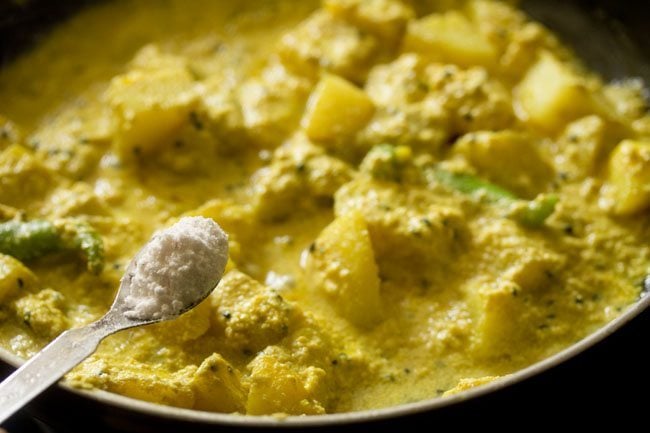
20. Mix again.
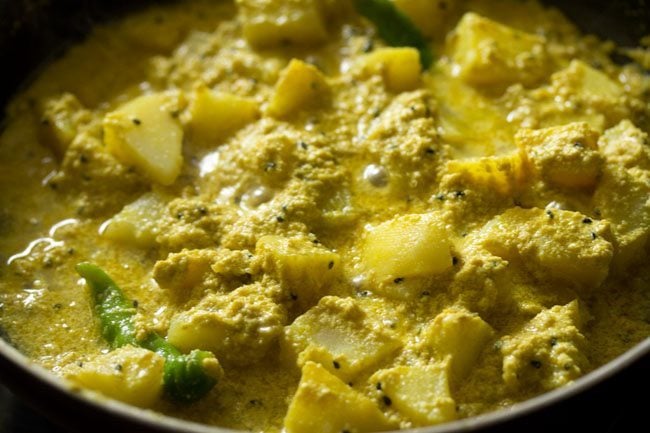
21. Cover the pan with a lid and simmer on low heat until all the water evaporates, and the potatoes are fully cooked. By this time, the poppy seed paste will also be cooked.
Be cautious not to overcook the potatoes. During the cooking process, check a couple of times. If you find the potatoes are undercooked and the water has dried up, add some water as needed.
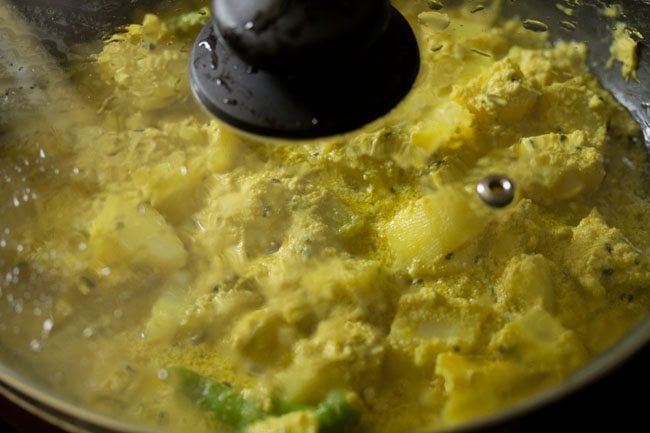
22. Maintain a dry consistency without any water remaining in the pan. The poppy seed paste should effectively coat the potatoes.
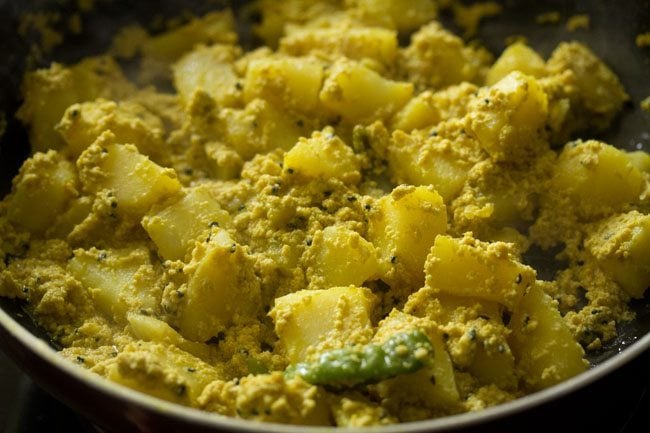
Serving Suggestions
Serve the Aloo Posto hot, accompanied by steamed rice and/or dal. You can also accompany a side of Bhaja (fried vegetables) when serving Aloo Posto with rice.
Crispy fried vegetables like Begun Bhaja made with brinjal (eggplant) and with pointed gourd make excellent side dishes. The textural contrasts will add a delightful element to your meal.
A refreshing Cucumber Raita can provide a cooling element to balance the spiciness, especially if you have added more green chilies or red chili powder to your Aloo Posto.
Storage
Store leftovers in the refrigerator in an airtight container for about a day. The consistency will thicken more after refrigeration. So while reheating, add some water to loosen the thick consistency.
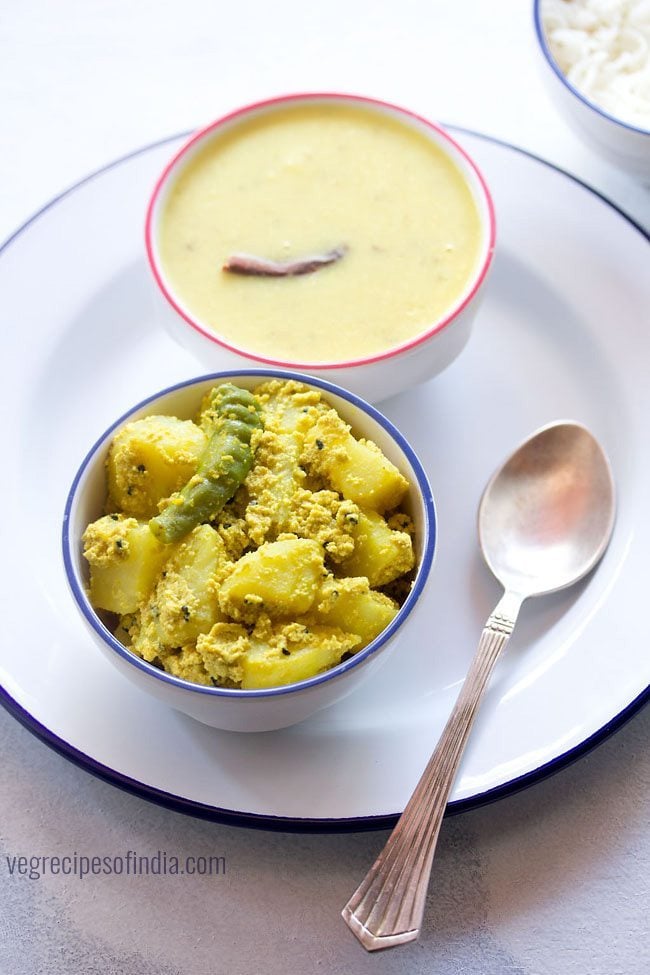
Bengal’s Love For Posto
Posto or poppy seeds is one of the essential ingredients in Bengali food repertoire. It is also by default present at any person’s home, who’s from Bengal or has Bengali roots. This holds true even for the ‘probashi’ ones – a Bengali who’s born and brought up outside West Bengal.
Just like the loved Aloo Posto, there are many posto-based dishes that are quite synonymous with Bengali cuisine and made in Bengali households. For instance, the posto bora (crunchy poppy seed pakodas or fritters) and jhinge posto (similar to Aloo Posto, with just the potato replaced by ridge gourd or jhinge).
Another delicacy is raw poppy seed/posto ground with just green chilies, onions, and had with steamed rice with some salt and a generous drizzle of mustard oil. Yes, Bengali meals are also incomplete without mustard oil, either cooked into dishes or consumed raw like this.
The excessive use of poppy seeds and mustard oil, amongst other ingredients, does bring a prolific and unique or unusual flavor in Bengali dishes. Thus, for a non-Bengali, it surely takes a while to develop a taste for this celebrated cuisine. Although, there’s no looking back after that!
The origin of Aloo Posto recipe is believed to be in the British era, where they transformed all of Bengal’s agricultural lands into fields of poppy, which led to a shortage of other veggies. This being a reason, a farmer’s wife once experimented and created a dish with dried and leftover poppy seeds, mustard oil and potatoes. Thus, the Aloo Posto was born.
Expert Tips
- Generally, Aloo Posto is dryish (dry to semi-dry). Addition of water can be more or less as per what your preference of consistency is.
- Use best quality poppy seeds, which are also in their shelf life. While preparing the poppy seed paste, you can skip the green chilies.
- To make the grinding part easier, soak the poppy seeds overnight. Just in case you miss soaking the posto this way, soak it in warm water for a couple of hours.
- Opt to use baby potatoes or new potatoes instead of regular potatoes. If you prefer you can keep the peels of the baby potatoes.
- Some sugar and red chili powder can also be added. Adding turmeric powder is not compulsory.
More Bengali Recipes To Try!
Bengali Recipes
Bengali Recipes
Bengali Recipes
Bengali Recipes
Please be sure to rate the recipe in the recipe card or leave a comment below if you have made it. For more vegetarian inspirations, Sign Up for my emails or follow me on Instagram, Youtube, Facebook, Pinterest or Twitter.
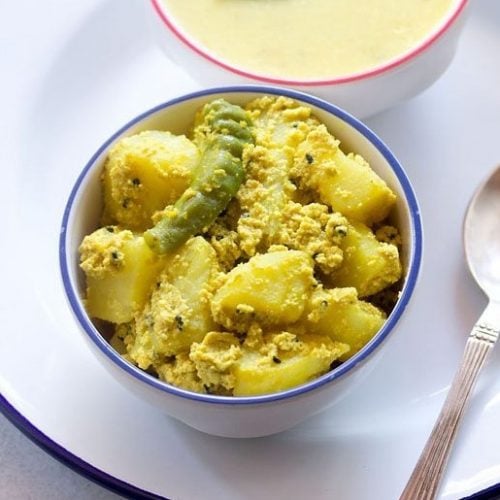
Aloo Posto Recipe
Ingredients
For posto paste
- 3 tablespoons white poppy seeds (khus khus)
- ¼ cup water – for soaking
- 1 tablespoon water – for grinding
- 1 green chilli – roughly chopped or 1 teaspoon, chopped
other ingredients
- 300 grams (2 large) potatoes
- 2 tablespoons mustard oil
- ½ teaspoon nigella seeds (kalonji)
- ¼ teaspoon turmeric powder – optional
- 2 green chilies – whole with their crowns removed, not slit
- salt according to taste
- ½ to ⅔ cup water or add as required
- ¼ teaspoon sugar (optional)
Instructions
Making poppy seeds paste
- Soak the poppy seeds in ¼ cup water for 3 to 4 hours or overnight . If you forget soaking , then soak in lukewarm water for an hour or so.
- After overnight soaking, use a fine mesh strainer and drain all the water.
- Add the poppy seeds in a small chutney grinder.
- Add 1 green chili and 1 tablespoon water.
- Grind to a fine paste. Add more water if needed while grinding the soaked poppy seeds.
Making aloo posto
- Next rinse, peel, and cut the potatoes into pieces measuring 1 to 1.25 inches.
- Heat mustard oil in a pan or kadai (wok) and let it gently smoke on a medium heat.
- Lower the heat and add ½ teaspoon nigella seeds (kalonji).
- Stir and saute the nigella seeds for a few seconds.
- Add the chopped potatoes. Stir to combine and mix the potatoes evenly with the mustard oil and nigella seeds.
- On low heat, sauté the potatoes, stirring occasionally, until they are halfway cooked or exhibit a faint golden hue at the edges.
- Next sprinkle turmeric powder all over the potatoes. Turmeric is an optional ingredient.
- Stir and mix well.
- Add the poppy seeds paste and two whole green chilies. Scrape of all the poppy seeds paste from the grinder jar and add. You can even rinse the jar with some water and then add the water in the pan.
- Mix thoroughly to combine all the ingredients.
Cooking further
- Next add ½ to ⅔ cup water. The amount of water required depends on the consistency you want. Usually aloo posto has a dry to semi-dry consistency, but for a gravy consistency you can add some more water.
- Stir and mix very well.
- Season with salt and mix again. You can also add sugar if you prefer.
- Cover the pan with a lid and on a low heat simmer till all the water dries up and the potatoes are cooked. The poppy seeds paste will also cook by then. Do not overcook the potatoes. Do check a couple of times when the potatoes are cooking.
- The consistency should be dry and there should be no water in the pan. The poppy seeds paste will also coat the potatoes.
- While serving you can place some fresh green chilies if you want as a garnish or serve aloo posto as is with some steamed rice.
Serving & Storage
- Serve the Aloo Posto hot, with steamed rice and/or dal. You can also pair a side of Bhaja (fried vegetables) when serving Aloo Posto with rice. If you like, pair this meal with your preferred raita or papad.
- Store leftovers in the refrigerator in an airtight container for about a day. The consistency will thicken more after refrigeration. So while reheating, add some water to loosen the thick consistency.
Notes
- Add water as needed to alter the consistency.
- Green chili is optional in the aloo posto paste.
- Turmeric powder is optional.
- Ensure fresh, good-quality poppy seeds without a stale or rancid smell.
- Consider adding a bit of sugar for a subtle sweet taste.
- Red chili powder can also be included if desired.
Nutrition Info (Approximate Values)
This Aloo Posto Recipe from the blog archives was first published on October 2016. It has been updated and republished on January 2024.
